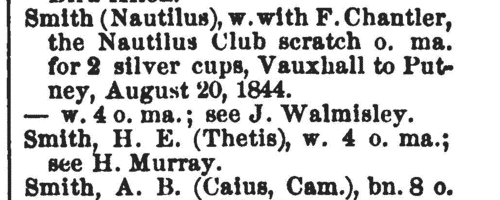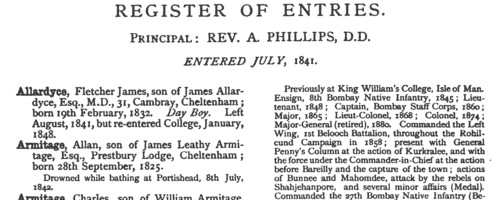Furnival Surname Ancestry ResultsOur indexes 1000-1999 include entries for the spelling 'furnival'. In the period you have requested, we have the following 144 records (displaying 81 to 90): Single Surname Subscription | | | Buying all 144 results of this search individually would cost £754.00. But you can have free access to all 144 records for a year, to view, to save and print, for £100. Save £654.00. More... |
These sample scans are from the original record. You will get scans of the full pages or articles where the surname you searched for has been found. Your web browser may prevent the sample windows from opening; in this case please change your browser settings to allow pop-up windows from this site. Gentlemen amateur rowers
(1835-1851)
Rowing was one of the English sports covered in detail in the pages of Bell's Life in London, and from these was compiled a compendium called the Aquatic Oracle. The text is divided into two main parts: Gentlemen Amateurs and Watermen. All the entries are cross-referenced, and use these abbreviations: w., won; l., lost; b., beat; bn., beaten; sc. ma., scullers' match; o. ma., oars match; do. sc. ma., double scullers' match; 4 o.ma., 4 oars match; 8 o. ma., 8 oars match; sk., stroke; cox., coxswain; as., a side; Oxon., Oxonian; V. to P., Vauxhall to Putney; W. to P., Westminster to Putney; P. to M., Putney to Mortlake; M. to P., Mortlake to Putney; dis., distance.FURNIVAL. Cost: £6.00.  | Sample scan, click to enlarge

|  Dissolutes under correction in Surrey and their attendants
(1851) Dissolutes under correction in Surrey and their attendants
(1851)
The 1851 census return for the Bridewell, founded by Henry VIII for the correction and reform of the dissolute. The institution lay in the parish of St George the Martyr, Southwark, in St Jude ecclesiastical district. FURNIVAL. Cost: £4.00.  | Sample scan, click to enlarge

| Residents of Belleville, Canada (1851)
'The Canada Directory: containing the Names of the Professional and Business Men of Every Description, in the Cities, Towns, and Principal Villages of Canada' brought down to November 1851. By Robert W. S. Mackay.
FURNIVAL. Cost: £6.00.  | Sample scan, click to enlarge

| Boys entering Cheltenham College
(1852)
Cheltenham College 'was founded in order to provide for the sons of gentlemen a Classical, Mathematical, and General Education of the highest order, on moderate terms, in strict conformity with the principles and doctrines of the Church of England.'
Andrew Alexander Hunter, the college registrar, compiled the first edition of the College Register in four parts from 1883 to 1886: these merely listed the boys by term of entry, with their dates of birth and names and addresses of their fathers. Circulars were also sent out to all Old Cheltonians whose addresses were known, requesting additional details. On the basis of the returns from these and Hunter's further researches, this much fuller register was published in 1890.
The information after each boy's name is given (where known and applicable) in this format: father's full name and address as of the time the boy entered the college; class and department on entering the college (classes being number from 1 downwards, and these again divided into A and B, some into C and D, others into P (Principal's side) and V. P. (Vice-Principal's side) - 1A was the highest class in each department: besides this, certain others were called Addiscombe, Woolwich, Civil, Direct, Line, Sandhurst, Naval, Special, Preparatory, Latin, and India Civil) and the same on leaving, name of Boarding House (or 'Day Boy'), scholastic and athletic honours attained at the college, and subsequent career (including date and place of death, or present address in 1890, if known).FURNIVAL. Cost: £4.00.  | Sample scan, click to enlarge

| Soldiers Killed in the Battle of Alma: 19th Regiment of Foot
(1854)
The commander of the British forces transmitted to the Secretary-at-War this return of casualties among non-commissioned officers and men sustained at and after the battle of Alma, 20 September 1854. This was the opening battle of the Crimean War, in which British forces seized the heights above the river Alma. The returns include those killed and wounded in the battle; missing; dead of wounds, and since dead, to 3 October 1854.FURNIVAL. Cost: £6.00.  | Sample scan, click to enlarge

| Bankrupts' Assignments
(1855)
Assignments of bankrupts' estates (usually to principal creditors and/or close relatives of the bankrupt) in England and WalesFURNIVAL. Cost: £6.00.  | Sample scan, click to enlarge

| Deaths, Marriages, News and Promotions
(1855)
Death notices and obituaries, marriage and birth notices, civil and military promotions, clerical preferments and domestic occurrences, as reported in the Gentleman's Magazine. Mostly from England and Wales, but items from Ireland, Scotland and abroad. July to December 1855.
FURNIVAL. Cost: £4.00.  | Sample scan, click to enlarge

| Patentees of New Inventions
(1855)
Abstracts of British patents for new inventions applied for and granted from 1 January to 31 December 1855: giving date, name and address, and short description of the invention. It is then stated whether 'Letters patent sealed' or 'Provisional protection only'.FURNIVAL. Cost: £6.00.  | Sample scan, click to enlarge

|  Persons of standing recommending London police recruits
(1843-1857) Persons of standing recommending London police recruits
(1843-1857)
The Metropolitan Police Register of Joiners (MEPO 4/334) lists policemen joining the force 1 January 1843 to 1 April 1857 (warrant numbers 19893 to 35804). The register is alphabetical, in so far as the recruits are listed chronologically grouped under first letter of surname. It gives Date of Appointment, Name, Number of Warrant, Cause of Removal from Force (resigned, dismissed, promoted or died), and Date of Removal. Although the register was closed for new entrants at the end of 1842, the details of removals were always recorded, some being twenty or more years later. Those recruits not formerly in the police, the army, or some government department, were required to provide (normally) at least two letters of recommendation from persons of standing, and details of these are entered on the facing pages. Where a recruit was only recently arrived in the metropolis, the names and addresses of the recommenders can be invaluable for tracing where he came from. Those recruits not formerly in the police, the army, or some government department, were required to provide (normally) at least two letters of recommendation from persons of standing, and details of these are entered on the facing pages: the names in these are indexed here (the police recruits are indexed separately and not included here). Recruits transferred from other forces or rejoining the force did not normally need recommendations - in the latter case, former warrant numbers are given - but some recommendations are from police inspectors, even other constables. Recruits coming from the army sometimes have general military certificates of good conduct, but most often have a letter from their former commanding officer; recruits recommended by government departments (most often the Home Office) similarly have letters from the head of department. But the great majority of the names and addresses in these pages are of respectable citizens having some sort of personal acquaintance with the recruit. Where more than two recommendations were provided, the clerk would only record one or two, with the words 'and others'. Tradesmen are sometimes identified as such by their occupations; there are some gentry. Although the bulk of these names are from London and the home counties, a scattering are from further afield throughout Britain and Ireland. FURNIVAL. Cost: £8.00.  | Sample scan, click to enlarge

| Patentees of New Inventions
(1857)
Abstracts of British patents for new inventions applied for and granted from 1 January to 31 December 1857: giving date, name and address, and short description of the invention. It is then stated whether 'Letters patent sealed' or 'Provisional protection only'.FURNIVAL. Cost: £6.00.  | Sample scan, click to enlarge

|
Research your ancestry, family history, genealogy and one-name study by direct access to original records and archives indexed by surname.
|













